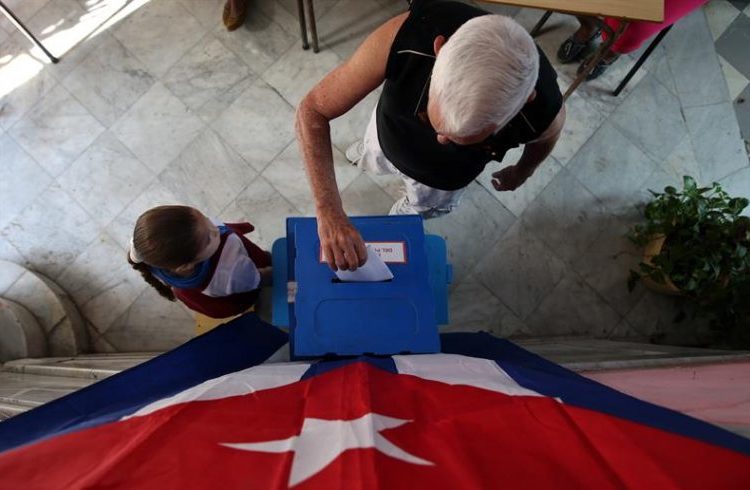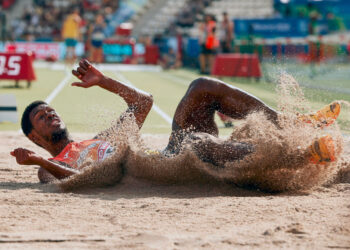The official results of the elections in Cuba are already known. According to data published on Monday the 19th, during the election day of March 11 a total of 85.65 percent of the registered voters on the island cast their vote.
The National Electoral Commission (CEN) confirmed the number of voters (7,399,891) given the week before in the preliminary report, but explained that after the updating of the registries based on the checking of inclusions, exclusions and duplicates, the total of voters was set at 8,639,989.
The figure represented a reduction of around 300,000 persons in relation to the preliminary listing (8,926, 575), which made it possible for an increase of close to 3 percentage points in relation to the percentage of voters initially reported (82.90).
However, if compared to the first part of the elections, when the delegates to the Municipal Assemblies were elected, it represents a drop in the number of voters as well as in the percentage in relation to the registered voters.
This year they are the lowest number of voters and all-time percentage in these electoral processes in Cuba since their start in 1992.
!function(e,t,n,s){var i=”InfogramEmbeds”,o=e.getElementsByTagName(t)[0],d=/^http:/.test(e.location)?”http:”:”https:”;if(/^/{2}/.test(s)&&(s=d+s),window[i]&&window[i].initialized)window[i].process&&window[i].process();else if(!e.getElementById(n)){var a=e.createElement(t);a.async=1,a.id=n,a.src=s,o.parentNode.insertBefore(a,o)}}(document,”script”,”infogram-async”,”https://e.infogram.com/js/dist/embed-loader-min.js”);
!function(e,t,n,s){var i=”InfogramEmbeds”,o=e.getElementsByTagName(t)[0],d=/^http:/.test(e.location)?”http:”:”https:”;if(/^/{2}/.test(s)&&(s=d+s),window[i]&&window[i].initialized)window[i].process&&window[i].process();else if(!e.getElementById(n)){var a=e.createElement(t);a.async=1,a.id=n,a.src=s,o.parentNode.insertBefore(a,o)}}(document,”script”,”infogram-async”,”https://e.infogram.com/js/dist/embed-loader-min.js”);
The CEN ratified that 94.42 percent of the ballots deposited in the ballot boxes were valid, a figure higher than that of the first stage of the electoral process.
It also confirmed the percentage of blank and annulled ballots it had preliminarily reported, as well as the percentages of the vote for all the candidates (80.44) and the selective vote (19.56) in relation to the total of valid ballots.
Raúl Castro with the most votes
The CEN officially confirmed that the 605 candidates to deputies to the National Assembly of People’s Power were elected with more than half of the issued valid votes.
According to the lists published this Monday, the present President Raúl Castro received the biggest percentage of the votes in the elections with 98.77 percent. Thus, he was elected as deputy for the municipality of Segundo Frente, in the province of Santiago de Cuba.
He was followed, with the largest percentage of votes, by Alexis Estévez, candidate to deputy for the Guantánamo municipality of Maisí (97.4) and Lázaro Expósito (96.92) elected in Santiago de Cuba, where he has been the first provincial secretary of the Communist Party (PCC) since 2009.
Meanwhile, the Cuban first vice president and presumable successor of Raúl Castro, Miguel Díaz-Canel, got 92.85 percent of the votes in his native Santa Clara.
According to CEN, other well-known political figures in Cuba also received high percentages, confirming them as part of the Assembly, among them José Ramón Machado Ventura (2nd secretary of the PCC on the island), Commander Ramiro Valdés, Foreign Minister Bruno Rodríguez Parrilla, Mercedes López Acea (first secretary of the PCC in Havana and vice president of the Council of State), Minister of the Armed Forces Leopoldo Cintra Frías, and Esteban Lazo, president of the Cuban parliament.
In addition, public figures linked in one or another way to the island’s political leadership received a backing in the ballot boxes, like Mariela Castro Espín, daughter of President Raúl Castro and director of the Center for Sex Education; City of Havana Historian Dr. Eusebio Leal, and Fernando González and Gerardo Hernández, two of the five Cuban agents imprisoned in the United States.
!function(e,t,n,s){var i=”InfogramEmbeds”,o=e.getElementsByTagName(t)[0],d=/^http:/.test(e.location)?”http:”:”https:”;if(/^/{2}/.test(s)&&(s=d+s),window[i]&&window[i].initialized)window[i].process&&window[i].process();else if(!e.getElementById(n)){var a=e.createElement(t);a.async=1,a.id=n,a.src=s,o.parentNode.insertBefore(a,o)}}(document,”script”,”infogram-async”,”https://e.infogram.com/js/dist/embed-loader-min.js”);
In the Assembly
The 605 deputies elected will be responsible for electing the new Council of State and its new president next April. Women and those born after 1959 are a majority in this parliament, as well as white persons and university graduates.
Of the new deputies, 96 percent are members of the Communist Party or the Union of Young Communists, while 71 percent hold executive posts at some level.
More than 55 percent were elected for the first time to the National Assembly while only 19.67 percent have more than one legislature of experience.
!function(e,t,n,s){var i=”InfogramEmbeds”,o=e.getElementsByTagName(t)[0],d=/^http:/.test(e.location)?”http:”:”https:”;if(/^/{2}/.test(s)&&(s=d+s),window[i]&&window[i].initialized)window[i].process&&window[i].process();else if(!e.getElementById(n)){var a=e.createElement(t);a.async=1,a.id=n,a.src=s,o.parentNode.insertBefore(a,o)}}(document,”script”,”infogram-async”,”https://e.infogram.com/js/dist/embed-loader-min.js”);









